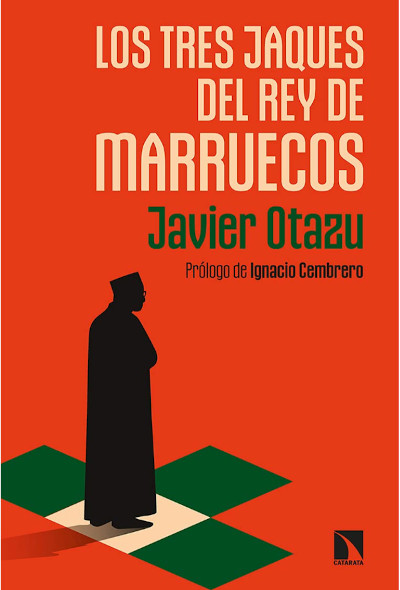In the picture
Cover of the book by Javier Otazu 'Los tres jaques del rey de Marruecos' (Madrid: Catarata, 2021) 126 pp.
The three issues core topic that, according to Javier Otazu, have conditioned relations between Rabat and Madrid for decades are migration issues, Western Sahara, and Ceuta and Melilla. The author, who knows the Moroccan reality from his years as a correspondent for the Efe agency, also exposes the weaknesses with which Spain manages the three issues in the face of a country like Morocco, which always comes out with a winning attitude.The most significant aspect of his book is that it explains the circumstances that led to the massive assault of more than 10,000 immigrants on the city of Ceuta in 2021 and the reasons that led Morocco to use its citizens in this way as a weapon of political pressure against Spain, openly and in the eyes of the whole world, even at the cost of damaging its international image.
Otazu begins by explaining the reason for the migratory obsession, which he attributes to hogra, a term that refers to the humiliation and repression suffered by many Moroccans, and to the glitter of Europe that attracts not only the needy, but also doctors, computer scientists and members of class , who seek not only better salaries, but also recognition and the quality of life offered by the other continent.
On the other hand, Morocco receives a large share of EU funds for border control to control the migration crisis, although Morocco argues that this is not enough and that the real cost of border control is much higher.
Second core topic: Ceuta. Although Morocco always refers to Ceuta and Melilla as occupied territories, this reference letter is no more than a slogan. In reality, claiming Ceuta and Melilla is not in the political diary of Mohamed VI. Ceuta is a commercial attraction that provides work for many Moroccans. In its schools children live together, favouring cultural integration between Muslims and Christians. It is easy to understand how the massive arrival of migrants frightened both Christians and Muslims.
Since Morocco closed its borders due to the coronavirus and thus greatly limited smuggling, Ceuta has suffered an economic crisis that demonstrates the city's heavy dependence on human flows with Morocco, and the fragility of the stability it has enjoyed in recent years.
Third core topic: Western Sahara. For Morocco, sovereignty over the Sahara is an existential question that no one in the country doubts. Rabat tries to sell a false image of integration between Saharawis and Moroccans that pretends that even Saharawis feel they belong to Morocco, and according to which the Polisario Front is a mercenary group that holds Saharawis hostage in refugee camps. The incident with Spain over the treatment in Spain of Sahrawi leader Brahim Ghali is related to this issue.
On the other hand, because press freedom is virtually non-existent, foreign journalists are not allowed to go to the conflict zone to report, and if they are allowed to do so, it is in an arbitrary manner and under full surveillance. Journalists and editors have to watch their words so as not to be expelled or convicted of false crimes such as rape, sexual abuse, etc. There are also no independent press organs, so in the end it is very difficult to know the truth from two very different versions.
Morocco is using Trump's recognition of Moroccan sovereignty over the Sahara in exchange for normalising relations with Israel to force Europe to clarify its position on the issue. The tripartite agreement between the US, Morocco and Israel showed that important foreign policy decisions are made by the king and his entourage, as this important issue was not passed through parliament or explained to the public. Morocco today is an authoritarian monarchy where Mohammed VI's decisions are not questioned and the parliament is a body that has no real influence whatsoever.
On the other hand, Rabat has not hesitated to retaliate militarily, economically or diplomatically, regardless of the size of the adversary. What is most striking, the book notes, is that none of the countries or institutions concerned have taken reciprocal measures against Morocco, but have accepted to bow down to Morocco, which has shown that it defends its interests tooth and nail.
The author also mentions the role of Algeria in supporting the Polisario Front, the ineffectiveness of the UN's mission statement for the Referendum in Western Sahara (MINURSO) and the support Morocco finds for its thesis in part of the UN Security Council committee , an organisation that does not even mention the pseudo-war in the Sahara in its resolutions. In this status, the Polisario can only resort to the judicial front in defence of its interests in a conflict that does not leave the door open to any negotiation subject with a win-win solution. Therefore, the only way left to the Polisario Front is through the courts, as Morocco is negotiating with the EU over resources that are not its own, but are taken from this area whose sovereignty has yet to be determined. What is clear is that Morocco will never allow a referendum on self-determination to take place, as the demonisation of the Polisario does not leave the door open to any negotiation with a win-win outcome, subject .
Otazu synthesises in just 126 pages, in a simple and objective manner, the critical issues of relations with Morocco whose future is uncertain, partly due to the asymmetrical morality that the EU practices with Morocco, whereby Brussels takes a stance on human rights violations in Latin America or Russia while ignoring them in the Maghreb country. It seems that it has taken an assault like that of 17 May 2021 in Ceuta for the diplomatic world to react and speak out against the authoritarianism of Mohammed VI.
* An abridged version of this review was previously published in the recommended reading section of Global Affairs Journal #4.

